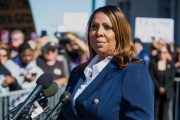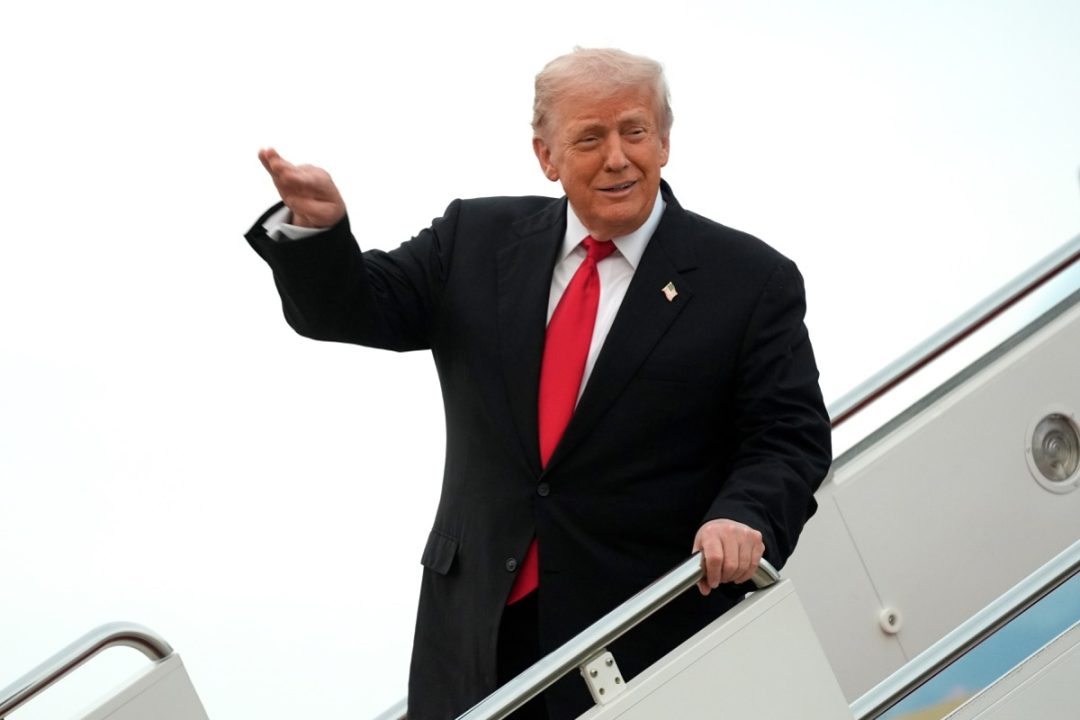
After more than a monthlong lull, the Jeffrey Epstein saga roared back onto the political scene and into President Donald Trump’s lap on Wednesday. Early in the day, Congressional Democrats released emails suggesting the president knew of Epstein’s sex-trafficking racket. And Adelita Grijalva’s (R-Ariz.) addition of her name to the discharge petition later in the day secured Rep. Thomas Massie (R-Ky.) the final signature needed to push a vote on releasing the Epstein files.
The president responded to the released emails with his usual defensive strategy. “The Democrats are trying to bring up the Jeffrey Epstein Hoax again because they’ll do anything at all to deflect on how badly they’ve done on the Shutdown, and so many other subjects,” he said in a Truth Social post.
Trump has consistently denied any participation in or knowledge of Epstein’s sex-trafficking operation. But his dismissive posture toward the ordeal and the attempt to make it all go away since being reelected have only ignited suspicion. Wednesday’s emails likely only inflamed said suspicion.
The president’s attempt to paint the push for transparency as purely a Democratic effort is misleading. Among the most zealous supporters for transparency are those in the MAGA coalition. The issue rose to prominence after Trump’s reelection, at the behest of his supporters. But after sensing an opportunity to harm the president, Democrats got on board.
Emails Released
On Wednesday, Democrats on the House Oversight Committee released emails in which Epstein appears to have written that Trump knew what the pedophile was up to. Assuming the emails are real, Epstein says in one of them, “of course he knew about the girls as he asked ghislaine (Maxwell) to stop.” Another email suggests a victim spent hours with Trump while at Epstein’s house.
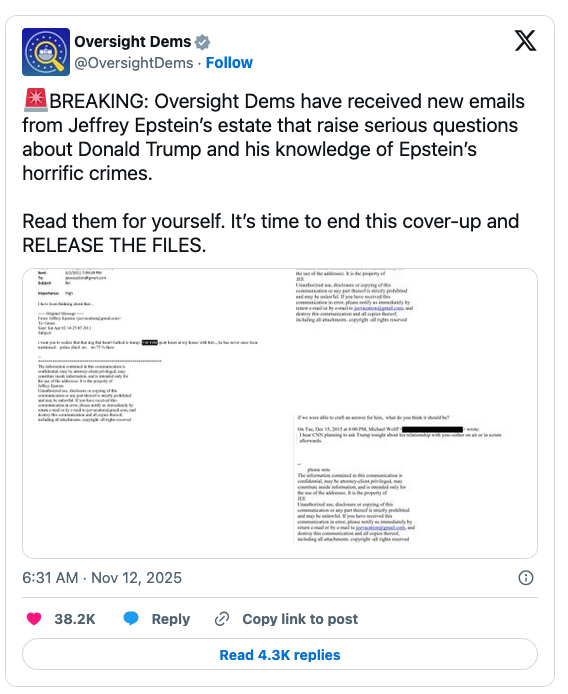
A couple of hours after Democrats released those emails, the House Oversight Committee, chaired by Rep. James Comer (R-Ky.), dumped more than 20,000 Epstein-related pages. “Democrats whine about ‘releasing the files,’ but they only cherry-pick when they have them to generate clickbait. You deserve the truth,” the committee said in an X post that includes a link to the documents they released. Noticeably, the committee didn’t deny the authenticity of the emails pushed out by the Democrats.
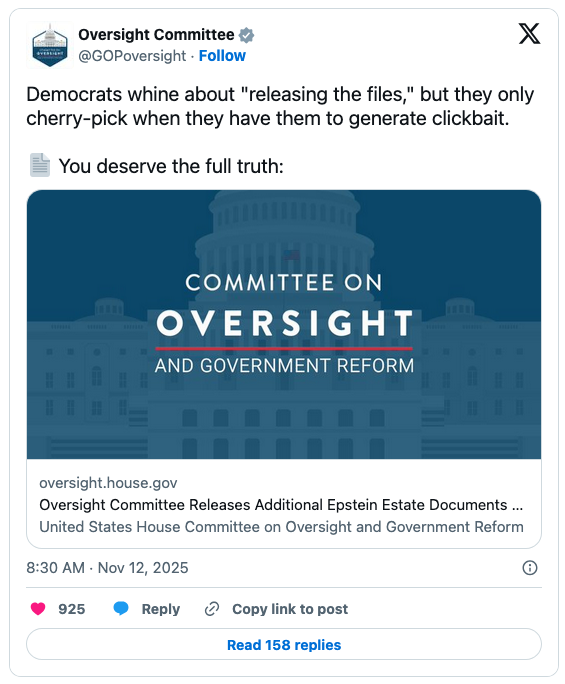
The Republicans also took issue with the email’s guilty insinuation. “Why did Democrats cover up the name when the Estate didn’t redact it in the redacted documents provided to the committee?” they asked in a prior post. “It’s because this victim, Virginia Giuffre, publicly said that she never witnessed wrongdoing by President Trump. Democrats are trying to create a fake narrative to slander President Trump. Shame on them.”
Rep. Nancy Mace of South Carolina, one of the few Republicans who signed the discharge petition, excoriated the Democrats over the emails. “I AM SO SICK OF THE FAKE NEWS FOCUSING ON TRUMP AND NOT EPSTEIN VICTIMS!,” she wrote in a social media post. “Everyone knows Trump kicked Epstein out of Mar A Lago and Epstein victims have exonerated the President!”
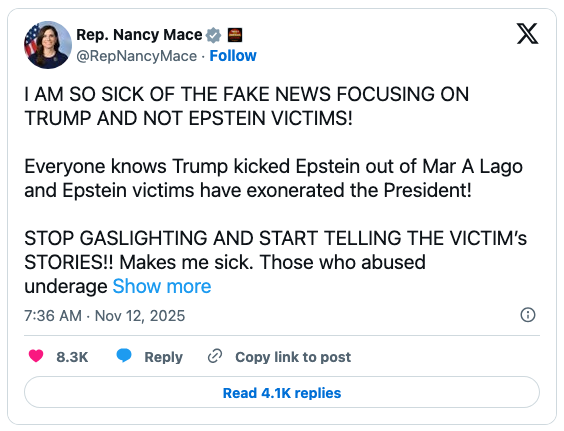
Massie’s Discharge Petition
The latest development is related to a Republican whom Trump is actively working to oust from Congress. Said Thomas Massie:
In spite of a last ditch effort by the President to foil the motion, and @SpeakerJohnson’s propaganda, the discharge petition I have been leading just succeeded! In December, the entire House of Representatives will vote on releasing the Epstein files.
The representative has been working with California Democrat Ro Khanna to get the Justice Department (DOJ) to release the files it has on Epstein. The discharge petition will circumvent House leadership and force representatives to vote on a resolution called the “Epstein Files Transparency Act,” which would make publicly available, with some exceptions, all Epstein files in the DOJ’s possession.
Grijalva’s special-election victory in September gave Massie the final signature needed for the discharge petition. Massie included, only four Republican representatives signed the petition. The others are Mace, Marjorie Taylor Greene of Georgia, and Lauren Boebert of Colorado.
Grijalva’s signature will “trigger a countdown for the bill to hit the House floor,” Politico reported:
It will still take seven legislative days for the petition to ripen, after which [House Speaker Mike] Johnson [R-La.] will have two legislative days to schedule a vote. Senior Republican and Democratic aides estimate a floor vote will come the first week of December, after the Thanksgiving recess.
House Republicans have opposed Massie’s efforts while engaging in their own release attempts, including the one that happened Wednesday, which drew accusations from Democrats that Republicans were engaging in a disorientation campaign. Massie has even suggested the government shutdown continued as long as it did because Speaker Johnson wanted to avoid the vote. And he has also criticized the GOP’s releases as part of a ploy that gives Republicans and the Trump administration control over what is released.
The White House Meeting
After news broke about the emails and Massie announced that he had the votes needed for the petition, CNN reported that the Trump administration was meeting to discuss the petition. The White House summoned one of the signers of the petition to that meeting. According to CNN:
One of the sources said the planned meeting would include Attorney General Pam Bondi, Deputy Attorney General Todd Blanche, FBI Director Kash Patel and Republican Rep. Lauren Boebert of Colorado, who has wanted the Justice Department to release their trove of Epstein files and has signed onto the effort in the US House to force the vote compelling their release.
White House press secretary Karoline Leavitt confirmed the meeting took place. She hailed it as an example of “transparency” that shows how administration officials “are willing to sit down with members of Congress and address their concerns,” according to The New York Times. The Times insinuated the meeting was designed to pressure Boebert to remove her name from the petition.
No Evidence?
As for the DOJ, the position of the FBI, essentially, is that it doesn’t have any other credible information to release. On June 7, the bureau put out a memo concluding that there is no evidence that a client list exists, Epstein never blackmailed anyone, and he really did commit suicide. Alleged Epstein victims vehemently dispute the part about there being no clients. In early September, eight of them said during a press conference that they were personally trafficked to clients by Epstein.
The recent disowning of Prince Andrew by the United Kingdom Royals also bolsters the suspicion that there were clients. Virginia Giuffre, who reportedly died of suicide this year, alleged she was trafficked to the former prince by Epstein. There is even a photo of the two together that has been widely circulated for years. And from the looks of it, Buckingham Palace doesn’t believe Andrew is innocent. The Royals’ short statement on its decision to banish him implied that he’s guilty of something.
A few months after the FBI released its nothing-more-to-see-here memo, Patel said the reason for the lack of more credible information stemmed from the original 2006 case filed in Florida. That case “involved a very limited search warrant or set of search warrants and didn’t take as much investigatory material as it should’ve seized,” the FBI director said. He said the case was built in a way that sealed the material behind court orders and “barred future prosecutions for those involved at that time.”
Backlash
The memo suggested the DOJ intended for everyone to move on. But that didn’t happen. Instead, a firestorm of backlash erupted, mainly among Trump supporters. The conclusions were simply unbelievable.
By September, Patel was fielding questions from Congress. During the House Judiciary Committee hearing on oversight of the FBI, Massie pointed out that the constraints Patel cited “only applied to the Southern District of Florida,” where that agreement was struck. “They do not apply to the Southern District of New York [SDNY], the location of the 2019 sex-trafficking indictment, which produced many things, including a series of FD-302 documents, according to victims who cooperated with the FBI in that investigation,” the Kentucky legislator said. Nevertheless, Patel stayed the course, insisting that if any other credible information existed, his agency would have followed up on it.
During that same hearing, Massie dropped the name of an alleged client and indicated he knew the identity of 19 others. The name he brought up was Jes Staley, a former JPMorgan banking executive who has been blackballed from the banking industry for his suspected participation. The Virgin Islands sued JPMorgan and accused Staley himself of funneling Epstein’s money. The lawsuit revealed emails between the two that “suggest that Staley may have been involved in Epstein’s sex-trafficking operation,” according to reports.
What Did Trump Know?
As for Trump, the FBI’s June 7 memo created a lot of suspicion that he may have known more about or been more involved in Epstein’s sex-trafficking operation than he has let on. According to a July 23 Wall Street Journal article based on talks with senior administration officials, once DOJ officials began looking over the “truckload” of Epstein documents, “they discovered that [Trump’s] name appeared multiple times.” During a meeting following these discoveries, the president learned the DOJ didn’t plan to release any more Epstein files. The official reason was because they contain child pornography and would reveal the victims’ personal information. The Journal report painted that meeting as the watershed moment the Trump DOJ decided there would be no “Phase II” of the Epstein files.
Trump never denied the meeting happened or pushed back on the allegations that his name is in the files. The fact that he’s named in the files is not proof of guilt.
Nevertheless, suspicion abounds. Trump and Epstein were friends for 15 years, with their paths likely crossing first in the late 1980s. They attended parties together. They did business together. Investigative journalists believe they met when Epstein began delving into real estate, which was Trump’s bread-and-butter business. The two were even neighbors in Florida, and partied together in the nightlife circuit. Some say they had a fallout in 2004 over a piece of real estate that Trump bested Epstein on. However, others say their fallout was because Epstein tried to poach a Trump staffer.




